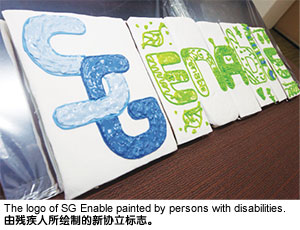 Previously known as the Centre for Enabled Living, SG Enable came into being on 1 July 2013. The change in name also came with a shift in focus — the Centre for Enabled Living served both persons with disabilities and the elderly, whereas SG Enable now focuses solely on persons with disabilities.
Previously known as the Centre for Enabled Living, SG Enable came into being on 1 July 2013. The change in name also came with a shift in focus — the Centre for Enabled Living served both persons with disabilities and the elderly, whereas SG Enable now focuses solely on persons with disabilities.
Disabilities in Singapore
Persons with disabilities make up about three per cent of Singapore’s population. These persons face challenges due to their physical, sensory, intellectual or developmental impairments.
Vision and Mission of SG Enable
Ms Ku Geok Boon, Chief Executive Officer of SG Enable, said that the organisation aims to help persons with disabilities live their lives to the fullest.
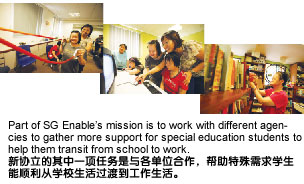 “Our vision — Inclusive Society, Enabled Lives — is a simple but powerful statement. Striving to meet the needs of persons with disabilities is at the heart of what we do. We believe that everyone has potential and aspirations. SG Enable seeks to enable persons with disabilities in Singapore to fulfil their aspirations and pursue independent and dignified lives. “Our vision — Inclusive Society, Enabled Lives — is a simple but powerful statement. Striving to meet the needs of persons with disabilities is at the heart of what we do. We believe that everyone has potential and aspirations. SG Enable seeks to enable persons with disabilities in Singapore to fulfil their aspirations and pursue independent and dignified lives.
“We adopt a person-centric approach to look at the individuals and their families from their perspectives and to anticipate their changing needs across life stages. We want to support persons with disabilities and to equip them with the necessary resources from a young age. Our mission is to empower persons with disabilities and their families, to enhance employment and employability options for persons with disabilities, and to engage the community in accepting persons with disabilities as integral members of the community. We are fortunate that we have a passionate team at SG Enable. Empathy and commitment are essential for the person-centric approach to succeed,” she explained.
Empowering Persons with Disabilities
To serve the needs of persons with disabilities better, SG Enable constantly seeks to enhance its service delivery. It works to empower persons with disabilities and their families by communicating information to them so that well-informed decisions can be made. It also provides access to timely assistance.
Enhancing Employment and Employability Options
To enable more persons with disabilities achieve self-reliance through employment, SG Enable uses a two-pronged approach of creating multiple training pathways and expanding the range of work options available.
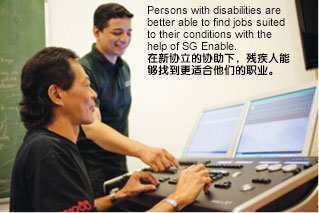 SG Enable considers the profiles of persons with disabilities and strives to provide training and work exposure for them. It also works at engaging employers to encourage the hiring of persons with disabilities, and identifying suitable industries or sectors for employment opportunities. SG Enable considers the profiles of persons with disabilities and strives to provide training and work exposure for them. It also works at engaging employers to encourage the hiring of persons with disabilities, and identifying suitable industries or sectors for employment opportunities.
“For graduates of Special Education (SPED) schools, our approach is to collaborate with agencies and partners to ensure a seamless transition from school to work. We are inspired by successful models that we have seen overseas where schools identify students’ interests as well as their vocational aptitudes and start preparing them for work and adulthood early. Parents are actively engaged in conversations to support their children with special needs in achieving their aspirations. This is upstream work that will take time to reap results,” Ms Ku explained.
Work preparation and job support are also needed by persons with acquired disabilities due to illnesses and accidents. SG Enable hopes to connect with this group of persons with disabilities to ensure that they have timely access to services and support in their transition back to the community and their work.
“Voluntary Welfare Organisations (VWOs) also play an integral role in our employment efforts and SG Enable will work closely with them to bring integrated support to persons with disabilities,” Ms Ku said.
Engaging the Community
To further integrate persons with disabilities into the community, SG Enable will step up its public education efforts. In addition to working with VWOs on some of the existing public education events and programmes, SG Enable will gradually develop a more sophisticated community and volunteer engagement programme.
“I think it will be very powerful when the community knows how their contributions benefit persons with disabilities. At the end of the day, it is the human strength and spirit that plays the pivotal role in creating an inclusive society that fully integrates persons with disabilities,” Ms Ku said.
SG Enable’s employment initiatives for persons with disabilities and engagement of the larger community are part of the nation’s efforts to create an inclusive society.
Second Enabling Five-Year Masterplan
In 2006, the government commissioned a committee comprising representatives from the community, and the private and public sectors to embark on the inaugural Enabling Masterplan 2007–2011. This first masterplan charted the development of programmes and services in the disability sector over a five-year period.
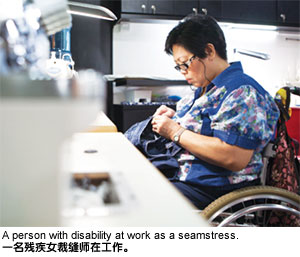 In 2012, the government drew up a second masterplan — Enabling Masterplan 2012–2016 — and pledged another $1 billion for its implementation. In 2012, the government drew up a second masterplan — Enabling Masterplan 2012–2016 — and pledged another $1 billion for its implementation.
To build on the results achieved, the second masterplan looks into further integrating persons with disabilities into the community. It also focuses on the crucial transition periods for persons with disabilities — from childhood to schooling to adulthood and joining the workforce.
“The masterplan uses a more person-centric approach to look at the needs of persons with disabilities and their families. We can declare success in fulfilling our goals if the transition across different life stages is smooth for most persons with disabilities, from coping with childhood disabilities to having access to employment options and care as adults.”
Early Intervention for Children
Early identification of children with special needs and intervention is one of the most important success factors in supporting children with disabilities. Hence, programmes have been developed to ensure that parents have access to quality pre-school support.
The first of these is the Early Intervention Programme for Infants and Children (EIPIC), which provides therapy and education support services to children with special needs. The programme equips them with motor, cognitive, communication, social, and self-help skills. There are 17 government-aided centres offering EIPIC, including the Asian Women’s Welfare Association, the Autism Resource Centre, the Society for the Physically Disabled and the Rainbow Centre.
If parents prefer to send their children to programmes offered by private organisations, they can also make use of the subsidies given under the Enhanced Pilot for Private Intervention Providers (PPIP), which was started two years ago. Under this scheme, each Singaporean child is provided with a base subsidy of $300 which can be used at a pre-approved private organisation. Families can also apply for additional means-tested subsidies.
Children with mild disabilities have the option of enrolling in centres offering the Integrated Child Care Programme (ICCP), in which they learn alongside peers in mainstream childcare centres. There are 17 centres running the ICCP, including those run by Care Corner Child Development Centre, Presbyterian Community Services, TOUCH Child Care & Family Centre, and the YWCA Child Development Centre.
In addition to these two programmes, the Development Support Programme (DSP) piloted in May 2012 will become a mainstay in pre-schools. In the programme, a team of mobile speech and language therapists, occupational therapists, Learning Support Educators, and psychologists go to pre-schools to provide assistance to children with mild learning and developmental needs.
Under the DSP, each child will have an individual education plan with an intervention package tailored to his or her needs. Each package may also comprise therapy and learning support, with weekly intervention sessions lasting up to four months depending on the child’s needs. Therapy sessions are facilitated by a psychologist, occupational therapist or speech therapist in one-to-one or small group sessions.
Learning support sessions are facilitated by trained Learning Support Educators who work with each child on specific issues, initially through intensive individual sessions, followed by in-class support sessions. Both types of sessions aim to improve the children’s developmental outcomes and school readiness. The programme also aspires to encourage a more inclusive pre-school environment and help pre-schools provide better support for children with mild developmental needs in their natural community setting.
When does a child need to go through the DSP?
“A teacher in a pre-school may observe a child experiencing considerably more difficulties than their peers in classroom learning or in expressing themselves. The Learning Support Educator attached to the pre-school will then put up an observation report. Following that, the team will convene a meeting where they will put together multidisciplinary input from teachers, Learning Support Educators and pediatric clinicians before deciding on the suitable intervention package.
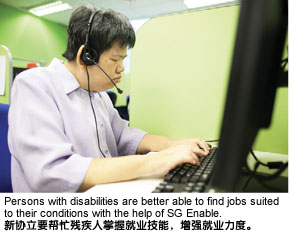 “There are therapy and learning support packages for the children. Depending on needs, each child can receive up to 15 hours in direct intervention time. This is a very important programme because we’re supporting the children with the necessary intervention at an early stage of their lives,” Ms Ku elaborated. “There are therapy and learning support packages for the children. Depending on needs, each child can receive up to 15 hours in direct intervention time. This is a very important programme because we’re supporting the children with the necessary intervention at an early stage of their lives,” Ms Ku elaborated.
Future Plans of SG Enable
In tandem with national initiatives, SG Enable aims to lower and remove the barriers that persons with disabilities face, elevate support for them, and facilitate the sharing of best practices amongst VWOs who look after persons with different disabilities.
One potential area of further collaboration with VWOs is the pooling of resources to find the right jobs.
“Rather than have each VWO duplicate the effort, SG Enable is currently looking at potential employers and sourcing for jobs, and the VWOs can in turn work with us to place persons with disabilities under their care in a wider continuum of job options.
“We want to work closely with VWOs to take the employment of persons with disabilities to the next level. This means ensuring that efforts to help individual persons with disabilities are coordinated so that we can enable them to achieve their aspirations.
“In our shared vision for an inclusive society, every Singaporean counts. Enabling persons with disabilities to lead fulfilling lives is an integral part of this aspiration for our community,” Ms Ku said. |